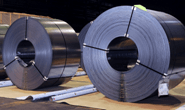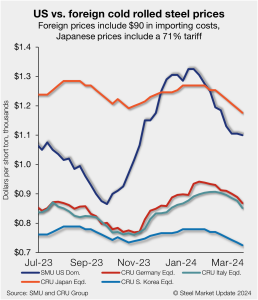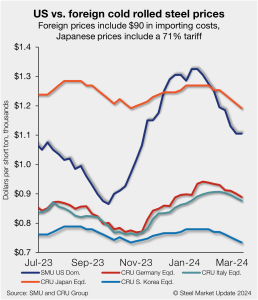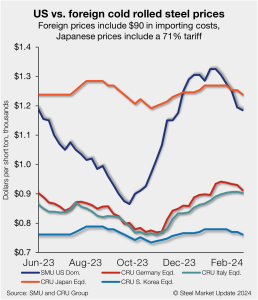US steel imports ramp up in March
Steel import licenses through March have now reached a nine-month high according to the latest data from the US Commerce Department.
Steel import licenses through March have now reached a nine-month high according to the latest data from the US Commerce Department.
Steel shipments from US mills were lower in February, both from January and from last year.

The US Department of Commerce’s International Trade Administration (ITA) has revised upwards the antidumping duty (AD) rates on imports of cold-rolled steel flat products from two South Korean producers.

Sheet prices moved higher this week for the second consecutive week, while plate prices ticked lower, according to our latest canvas of the steel market.

After stabilizing in our last check of the market, production times for flat-rolled steel have begun to push out further, according to steel buyers responding to SMU's market survey this week.

Steel buyers report that mills are less willing to talk price on new sheet orders than they were in weeks past, according to our most recent survey data. In contrast, mills’ willingness to negotiate on plate products remains relatively high, now at the second-highest rate of the year.
Galvanized buyers reported solid demand and balanced inventories this week and were anticipating the sheet price increase announced by Cleveland-Cliffs on Wednesday.

The dollar premium cold-rolled coil (CRC) carries over hot-rolled coil (HRC) continues to expand according to our latest scope of the market.
SMU’s sheet prices firmed up modestly this week, even as CME hot rolled futures declined. What gives? My channel checks suggest that demand remains stable and that buyers have returned to the market following new HR base prices announced by mills earlier this month. I’m looking forward to seeing whether lead times, which have stabilized, will start extending. SMU will have more to share on that front when we release updated lead time figures on Thursday. As for HR futures, what a reversal! As David Feldstein wrote last Thursday, bulls expected mill price increase announcements. And we briefly saw the May contract climb as high as ~$1,000 per short ton (st).

Sheet prices reversed course and moved higher this week, while plate priced remained flat, according to our latest canvas of the market.

Foreign cold-rolled (CR) coil remains notably less expensive than domestic product even with repeated tag declines across all regions, according to SMU’s latest check of the market.
Sheet and plate prices mostly moved lower this week after little change was noted the week prior. Despite edging down, sentiment is mixed, and many suggest a bottom may be near.

Foreign cold-rolled coil (CR) remains significantly less expensive than domestic product even as US tags continue to decline in a hurry, according to SMU’s latest check of the market.

Steel buyers found mills more willing to negotiate spot pricing on the products SMU tracks with the exception of hot rolled, according to our most recent survey data.

Steel mill lead times were flat to slightly up, according to our market survey this week.

Sheet and plate prices were mostly flat this week – largely in response to the mill price blitz from last week – pausing the downtrend they’d been on for the better part of 2024.
US steel mill shipments increased in January vs. December but fell from a year earlier,

The price premium cold-rolled coil (CRC) carries over hot-rolled coil (HRC) remains wide, according to our latest market check. Based on our steel price indices published Tuesday, the spread between these products is at the fifth-highest weekly level seen over the last 16 months.
Flat-rolled steel prices have been running downhill in a hurry since the beginning of the year. In some ways, it's no surprise because other indicators have also been pointing lower for some time. Lead times have been contracting since the beginning of the year and are now below the five-week mark for hot-rolled (HR) coil for the first time since September. Mills are more willing to negotiate lower prices, and early reports seem to indicate that scrap might settle lower again in March.
Sheet and plate prices this week continued the downward trend they’ve been on for most of 2024. Some market sources predicted that a wave of spring maintenance outages would help to stabilize lead times and prices in the weeks ahead – especially should service center inventories, high at the beginning of the year, come down meaningfully.

Steel mill lead times shrunk by an average of 0.3 weeks, according to our latest market survey, now nearing levels last seen in September of last year.

Steel buyers generally found mills more willing to negotiate spot pricing on the products SMU surveys this week, according to our most recent survey data.

US hot-rolled (HR) coil prices have fallen further this week, working their way to $800 per short ton (st) on average – a mark not seen since late October.

Foreign cold-rolled coil (CR) remains much less expensive than domestic product even as prices in the US have declined at a rapid pace over the past month, according to SMU’s latest check of the market.
We’ve all heard a lot about mill “discipline” following a wave of consolidation over the last few years. That discipline is often evident when prices are rising, less so when they are falling. I remember hearing earlier this year that mills weren’t going to let hot-rolled (HR) coil prices fall below $1,000 per short ton (st). Then not below $900/st. Now, some of you tell me that HR prices in the mid/high-$800s are the “1-800 price” – widely available to regular spot buyers. So what comes next, and will mills “hold the line” in the $800s?
US hot-rolled (HR) coil prices have fallen below $900 per short ton (st) on average for the first time since early November. SMU’s HR price stands at $875/st on average, down $65/st from a week ago and down $170/st from the beginning of the year.
Australia's BlueScope Steel has begun making plans to potentially add cold rolling and coating capabilities in the US.
What's the steel market talking about at present?

Mill lead times for flat-rolled steel were mostly stable over the past two weeks. With several mills slow to come out of outages and upgrades, cold rolled and coated lead times have been holding up better than hot rolled.

The percentage of sheet buyers finding mills willing to negotiate spot pricing rose or remained relatively flat on the products SMU surveys, while plate slumped, according to our most recent survey data.